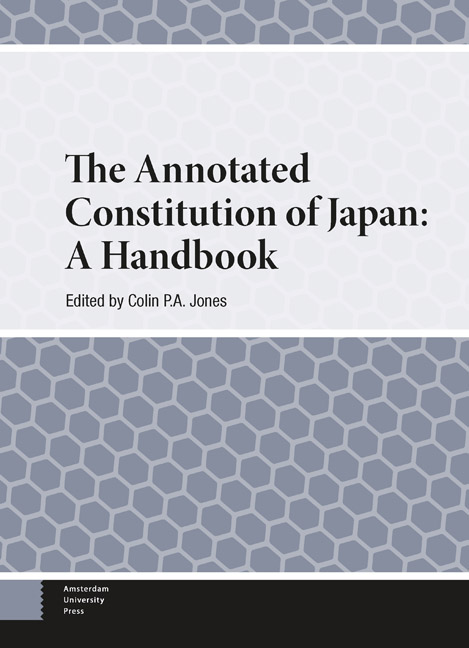Book contents
- Frontmatter
- Dedication
- Contents
- Contributors
- Preface
- Acknowledgements
- Introduction: Historical Overview
- The Preamble
- 1 Chapter I: The Emperor (Articles 1–8)
- 2 Chapter II: Renunciation of War (Article 9)
- 3 Chapter III: Rights and Duties of the People (Articles 10–40)
- 4 Chapter IV: The Diet (Articles 41–64)
- 5 Chapter V: The Cabinet (Articles 65–75)
- 6 Chapter VI: The Judiciary (Articles 76–82)
- 7 Chapter VII: Finance (Articles 83–91)
- 8 Chapter VIII: Local Self Government (Articles 92–95)
- 9 Chapter IX: Amendments (Article 96)
- 10 Chapter X: Supreme Law (Articles 97–99)
- 11 Chapter XI: Supplementary Provisions (Articles 100–103)
- Appendix 1 Constitution of the Empire of Japan (Japanese)
- Appendix 2 Constitution of the Empire of Japan (English translation)
- Appendix 3 The Potsdam Declaration
- Appendix 4 Instrument of Surrender
- Appendix 5 The “MacArthur Notes”
- Appendix 6 The GHQ Draft
- Appendix 7 The Constitution of Japan (Japanese)
- Appendix 8 The Treaty of San Francisco
- Bibliography
- Index
- Index of Articles of the Constitution of Japan
7 - Chapter VII: Finance (Articles 83–91)
Published online by Cambridge University Press: 13 February 2024
- Frontmatter
- Dedication
- Contents
- Contributors
- Preface
- Acknowledgements
- Introduction: Historical Overview
- The Preamble
- 1 Chapter I: The Emperor (Articles 1–8)
- 2 Chapter II: Renunciation of War (Article 9)
- 3 Chapter III: Rights and Duties of the People (Articles 10–40)
- 4 Chapter IV: The Diet (Articles 41–64)
- 5 Chapter V: The Cabinet (Articles 65–75)
- 6 Chapter VI: The Judiciary (Articles 76–82)
- 7 Chapter VII: Finance (Articles 83–91)
- 8 Chapter VIII: Local Self Government (Articles 92–95)
- 9 Chapter IX: Amendments (Article 96)
- 10 Chapter X: Supreme Law (Articles 97–99)
- 11 Chapter XI: Supplementary Provisions (Articles 100–103)
- Appendix 1 Constitution of the Empire of Japan (Japanese)
- Appendix 2 Constitution of the Empire of Japan (English translation)
- Appendix 3 The Potsdam Declaration
- Appendix 4 Instrument of Surrender
- Appendix 5 The “MacArthur Notes”
- Appendix 6 The GHQ Draft
- Appendix 7 The Constitution of Japan (Japanese)
- Appendix 8 The Treaty of San Francisco
- Bibliography
- Index
- Index of Articles of the Constitution of Japan
Summary
The nine articles comprising Chapter VII collectively vest the national government with financial power. Through these provisions the government exercises its power to raise, manage, and use money.
Article 83 establishes the basic principle underlying the chapter, which is referred to as “fiscal constitutionalism.” The financial powers of government influence people's lives and are manifested in the powers to impose and collect taxes, borrow money, and spend and manage the use and distribution of funds.
Chapter VII seeks to prevent the exercise of this power from unduly burdening the people. “No taxation except by law” is another general principle established by the Chapter, which requires government finances to be under the control of the democratically-elected Diet (see Articles 30 and 43). Moreover, unlike under the Meiji Constitution, there are no exceptions to this latter principle.
The finance provisions of the Meiji Constitution had 11 provisions (Chapter VI: Articles 62 to 72) and also espoused the basic principle that there would be no taxation without law (Article 62(1)). The Imperial Diet needed to pass a statute to impose a new tax or modify an existing one, and its consent was also needed in order to incur national debt or other liabilities chargeable to the National Treasury (Article 62(3)). Imperial Diet approval was also required for the annual budget (Article 64(1)).
However, the Meiji Constitution contained several exceptions to the principle of taxes requiring a legal basis. First, Article 62(2) excluded “all administrative fees or other revenue having the nature of compensation” from the scope of taxes or rates that needed to have a statutory basis. Second, Article 66 provided that expenses of the imperial house (which became a huge financial conglomerate in its own right) did not require the approval of the Imperial Diet. Third, if the Imperial Diet could not be convoked, Article 70(1) permitted emergency financial measures to be taken by imperial ordinance in cases of urgent need for the maintenance of public safety. Fourth, Article 71 permitted the government to use the prior year's budget if the Imperial Diet failed to pass a new one.
- Type
- Chapter
- Information
- The Annotated Constitution of JapanA Handbook, pp. 276 - 293Publisher: Amsterdam University PressPrint publication year: 2023

